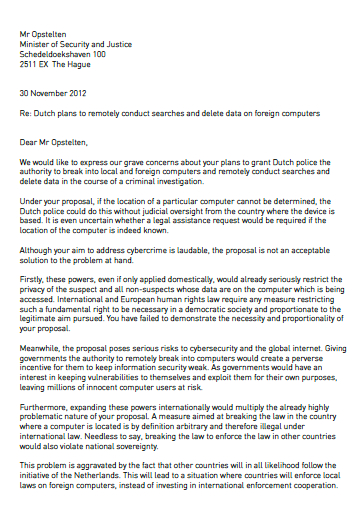International coalition calls for withdrawal of Dutch hacking plans
An international coalition of more than 40 civil rights organizations and security experts is “gravely concerned” about a Dutch proposal to break into foreign computers and search and delete data. In a letter handed over by Dutch digital rights organization Bits of Freedom to the minister of Security & Justice yesterday, the coalition urgently calls upon the minister to withdraw his proposal. The proposal will be debated in Dutch parliament this week.
The proposal would grant powers to the Dutch police to break into computers, including those located in other countries, in order to search and delete data and install spyware. The Dutch government argues that the new powers are required to effectively combat cybercrime in the Netherlands.
According to the international coalition, the proposal poses serious risks to the human rights and cybersecurity of individuals worldwide. This is aggravated by the fact that countries will likely follow the initiative of the Netherlands. This will lead to a situation where countries will enforce their local laws on foreign computers. These local laws would not solely address cybercrime, but also issues deemed illegal in other countries, such as blasphemy and political criticism.
The coalition strongly urges the minister to withdraw his proposal. The letter is signed by more than 40 members of civil society (see below). These include civil rights organizations such as the Electronic Frontier Foundation (US), Privacy International (UK) and European Digital Rights (EU). In addition, renowned security-experts and software developers Bruce Schneier (US), Richard Stallman (US) and Ron Deibert (Canada) signed the letter.
List of signatories:
- April – France
- Access – International
- Agorà Digitale – Italy
- Alternative Informatics Association – Turkey
- Article 19 – UK
- Association for Technology and Internet – Romania
- Bitbureauet – Denmark
- Bits of Freedom – Netherlands
- Bruce Schneier – US
- Chaos Computer Club – Germany
- Civil Rights Society Vrijbit – Netherlands
- Digitalcourage (FoeBuD) – Germany
- Digitale Gesellschaft – Germany
- Digital Rights – Ireland
- Electronic Frontier Finland – Finland
- Electronic Frontier Foundation – International, US
- European Digital Rights (EDRi) – Europe
- Foundation for Information Policy Research (FIPR) – UK
- Free Press Unlimited – Netherlands
- Global Voices – International
- Humanistic Association – Netherlands
- Imaginons un réseau Internet solidaire (IRIS) – France
- International Modern Media Institute (IMMI) – Iceland
- Internet Protection Lab – Netherlands
- Internet Society – Bulgaria
- IT-Political Association of Denmark – Denmark
- Iuridicum Remedium (IuRe) – Czech Republic
- La Quadrature du Net – Europe, France
- Net Users’ Rights Protection Association – Belgium
- Netzpolitik – Germany
- No2-ID Foundation – Netherlands
- Open Rights Group – UK
- padeluun – Germany
- Panoptykon Foundation – Poland
- Parents Online – Netherlands
- Platform for the Protection of Civil Rights – Netherlands
- Privacy First Foundation – Netherlands
- Privacy International – UK
- Quintessenz – Austria
- Richard Stallman – US
- Ron Deibert, Director, The Citizen Lab and Canada Centre for Global Security Studies, University of Toronto – Canada
- Statewatch – UK
- The Tor Project – US
- Vrijschrift / ScriptumLibre – Netherlands

